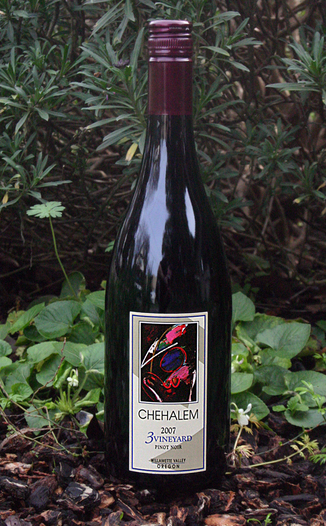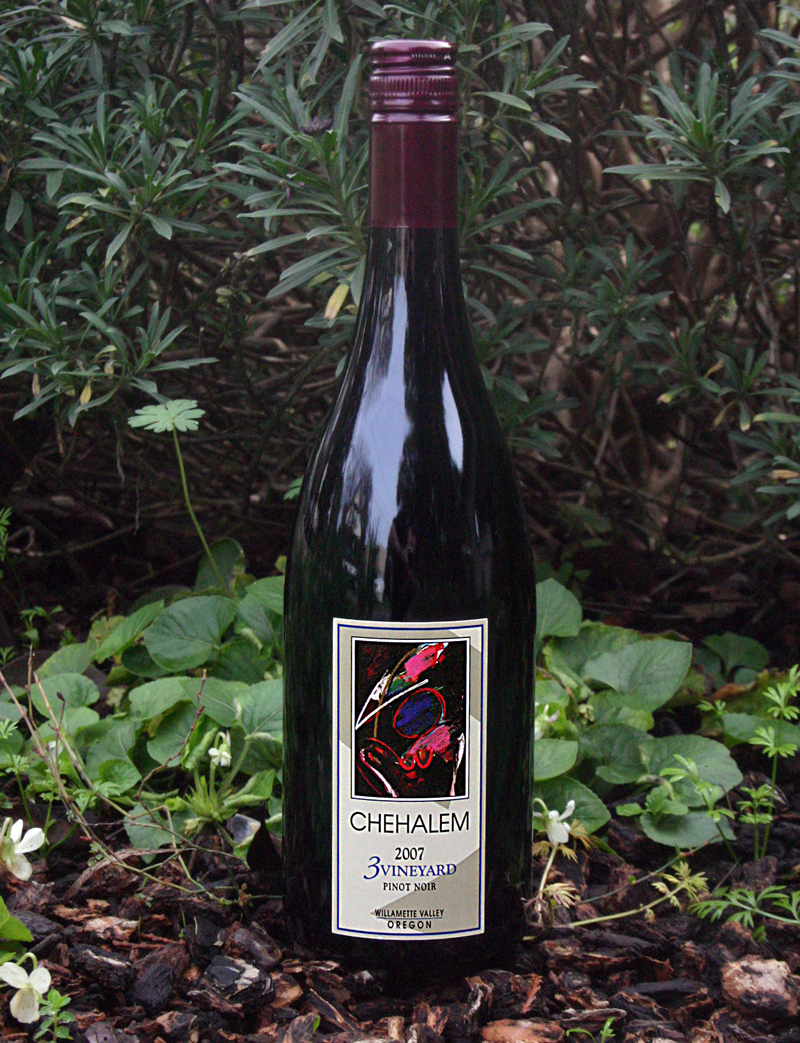What We Say 2007 3 Vineyard Pinot Noir
SECRET SAVINGS ALERT:
Subscribe to our Daily Dispatch (above) and you’ll always know what our Top Secret coupon code of the day is. Every day we issue a new members-only code that entitles you to Free Ground Shipping and, sometimes, an added discount!
Mission Codename: In the Valley of the Flowers
Operative: Agent Red
Objective: Roam Oregon’s lush Willamette Valley in search of a Pinot Noir that delivers
Mission Status: Accomplished!
Current Winery: Chehalem Wines
Wine Subject: 2007 3 Vineyard Pinot Noir
Winemaker:
Backgrounder:
The Oregon’s Willamette Valley, just south of Portland and along the Willamette River is well known for Pinot Noir and other Burgundian varietals. Its deep and fertile volcanic soil, cooler climate most directly effect viticulture. Most of the vineyards in this area are planted in the valley’s and hillsides along the river.
Wine Spies Tasting Profile:
Look – In intriguing fashion, this wine looks different from different angles; Viewed from a short distance away, the wine has distinct Cherry cola hues. Viewing the wine, top-down, the wine shows soft brandy hues. The edges of the wine, viewed up close, show as slightly bourbon-colored. The surface of the wine shows as soft and bouncy when swirled. When the wine settles down, thin tears streak the inner edge of the glass
Smell – this wine takes some time to develop fully, so I recommend that you decant it for at least 60 minutes for best results. On opening, the wine delivers a warm rush of deep earthen aromas, leading with wet forest floor, potting soil, tomato vine and dark dried flowers. After some time, though, the fruit really emerges, showing off dark cherry, Bing cherry and ripe blackberry. These sit easily atop bramble, soft spice and kola nut
Feel – Plush, soft and slightly round at the tip of the tongue, this wine has a soft to medium body, that seems to evolve on the palate with each sip – or as you hold the wine in your mouth
Taste – After decanting, well integrated flavors of red cherry, raspberry and tart cranberry with a good measure of earthiness, minerals, soft spice and subtlest flinty gunpowder
Finish – Earthy and soft, with round fruits that linger long after you sip. The minerals emerge and are more pronounced as the fruit flavors tails off, giving this wine a unique finish
Conclusion – The key to this wine is decanting. The more patient you are the greater your reward. I even revisited the wine after 12 hours in the opened and then re-corked bottle. After an hour and after 12, what a difference from just-opened. The fruits, which are almost hidden at first, really emerge. This evolution may be attributed to the youthfulness of the wine. Make no mistake, this wine is ready to drink. It just needs a little love (time in the air) to coax out all of it’s goodness. After some exposure to the air, this Willamette Valley Pinot Noir is a shining example of Oregon Pinot.
Mission Report
Today’s excellent Willamette Valley Pinot Noir seemingly fell in my lap. One of our covert operatives in Oregon ‘went off the reservation’ and infiltrated the winery without official approval from Wine Spies HQ.
Normally, unsanctioned missions are frowned upon (unless, of course, they are unsanctioned for a reason). In the case of today’s wine, I was so pleased when the winery itself – at the clever covert cajoling of our Operative – made contact with me recently.
Samples were couriered down to me, immediately, and I assembled an impromptu tasting panel. At first, the wine exuded a mostly-earthen character. We were surprised at this, as we had expected more fruit to be present on the nose. This all changed, however, with ample time in the glass, exposed to the air.
After a long interval, the wine transformed, opening up to reveal a great deal more fruit. We gave the wine 30 minutes, and then an hour, and the wine became something completely different that it had been on opening.
If you love great Oregon Pinot, I recommend that you give this one a whirl. Just be sure to allow it enough time to breath – and you will be rewarded with a delicious example of Willamette Valley Pinot Noir!
What the Winery Says
Chehalem Winery


Awards & Accolades:
Wine Advocate, August 2009, Jay Miller: 89. Medium-ruby colored, it offers up a fragrant nose of spice box, earth notes, cherry, and cranberry. Medium-bodied, it has a solid core of savory fruit, some ripe tannin, excellent balance, and 1-2 years of aging potential.
Wine Spectator, December 2009, Harvey Steiman: 89. Firm in texture, with a light grip to the dark berry and cherry flavors, turning toward mineral and chalk as the finish lingers…
The International Wine Review, April 2009: 89. …This medium light magenta wine shows aromas of toasty oak and herbal spice with underlying dark red fruit. There’s a good intensity of dark red fruit and spice on the palate and good acidity…
Wine Enthusiast, December 2009, Paul Gregutt: 88. A blend of barrels… this toasty Pinot brings watermelon, strawberries and rhubarb pie fruit flavors along with black tea and cola. Though relatively light, it does not lack for flavor interest. A fine effort…
Washington Post, August 12, 2009, Oregon Pinot Noir: Land Outweighs Hand, Dave McIntyre: TWO-AND-A-HALF STARS. Lively, elegant, light in body and silky in texture with a nice herbal note, this wine reflects a blend of sedimentary and volcanic soils. One of the three vineyards is organic, the other two in transition to organic certification.
San Francisco Chronicle, October 3, 2008, Oregon Pinot Noir, Lynne Char Bennett: TWO STARS. Perfumed with mushroom, forest and cherry, strawberry and cranberry aromas; very nice nose. Substantial tannins and structure with core of delicate fruit.
About This Wine:
An intense, red-fruited pinot with hints of black tea, smoke, and warm brown spices such as clove, nutmeg, and cardamom. High-toned fruit, edgy bright acid, fine tannin, and mineral length lead to a clean and succulent finish. This is an elegant, sweet-fruited pinot with exceptional aging potential. Cool indeed!
The Wine: This is our most widely distributed and earliest available Pinot Noir. It is a wine blended from all of our vineyards and bottled before the single-vineyard and reserve wines. The complementary nature of the lots that go into this blend is obvious in its full, early integration and its occasionally being considered superior to single-vineyard wines. ALL Pinots are made with the same care, receive the same oak, are from the same Estate Vineyards, etc. — the 3 Vineyard represents the very populist notion that egos and individuality may elevate some brothers and sisters, but the rest of us together are just as wise and powerful, sometimes even more so. Beginning in 2003, with the reduction of single-vineyard bottling production quantities, barrels of single-vineyard quality are now returned to the 3 Vineyard blend for even greater complexity.
The Vineyards: Fruit and the name come from our three Estate Vineyards: Ridgecrest, Stoller, and Corral Creek, blended into a fully-complemented wine. The estate vineyards are planted on three different soil types, which provide complementary elements in resulting wines, especially Pinot noir: Ridgecrest on Willakenzie, Stoller on Jory, and Corral Creek on Laurelwood. The excellence and distinctiveness of single vineyards can be seen in vineyard designated labels for these vineyards. However, the wisdom of complementary blends, with their consistency and fullness of character is very often seen in 3 Vineyard.
The Vintage: In summary, we think this may be a fantastic white vintage and a surprisingly good red vintage, despite a cool growing season and the final rains that many times might lead to less intense wines. Most winemakers in the valley knew how to adapt to the cooler weather and took advantage of the vintage’s attributes, such as lower sugars (and therefore alcohols) and higher acids. Because of the exciting influence of vintage in a cool climate like the Willamette Valley, you’ll see nuance differences between this 3 Vineyard and its older siblings. Expect ripeness but with a crisp, bright, fruit edge of minerality from higher acids and the cooler growing season. The vintage will have stellar wines, just with a greater range of styles. Buy whites in general, buy reds from trusted names.
About The Winery:
Chehalem (Chuh-hay-lum) is a local Calapooia Indian word best translated as “gentle land” or “valley of flowers,” phrases that capture a long-standing, almost religious reverence for the land. We understand this reverence, for we consider ourselves a vineyard winery, dedicated to reflecting as purely as possible what the vineyard has produced, with minimal processing, without compromising great fruit.
Chehalem traces its history back to vineyard operations started by Harry Peterson-Nedry in 1980 at Ridgecrest Vineyards, the pioneering wine operation on Ribbon Ridge, northwest of Newberg, Oregon. Bill and Cathy Stoller joined Harry in the winery in 1993 and subsequently began Stoller Vineyards—a densely planted, 125 acres on Stoller family farmlands at the southern tip of the Dundee Hills. Corral Creek Vineyards, adjacent to the winery facility, is Chehalem’s third estate vineyard. Our first release was the 1990 Ridgecrest Pinot Noir.
Equally well-known for red and white wine quality, we carry a passion and focus for cool climate varieties that reflect both site and climate in complex, structured and intensely fruited wines.
Our Pinot gris style is unique, largely because our standard for emulation is Alsace. We produce two distinct wines: a tank fermented Pinot gris that is bright and crisp, and a rich, round Pinot Gris Reserve that is barrel fermented in neutral oak. An intense, bone dry Riesling and rich, full fruited Pinot blanc continue our Alsace resemblance. We also produce a 100% tank-fermented, unoaked Chardonnay, INOX™, and Ian’s Reserve Chardonnay, a wine rich and full with 100% Dijon clone fruit.
For Pinot noir, our main distribution wine is the 3 Vineyard Pinot Noir, complemented by limited amounts of Reserve Pinot Noir and a vineyard designate from each of our estate vineyards.
Our philosophy and style do not always follow the industry norms or market trends. That we look for deftness and elegance in Pinot noirs at a time when black, opaque, extracted and heavily wooded wines are the norm, speaks to this sense. That we crop-thin Pinot gris as aggressively as Pinot noir and look for optimal ripeness such that it is harvested after Pinot noir indicates an almost obsessive attention to detail. At a time when Riesling is being pulled out, Chehalem counter intuitively plants prime acres to this variety, convinced it as sensitively reflects site and climate for white wine as Pinot noir does for red.
Call us crazy, but we think our objective is not to follow today’s trends, but is to lead to a novel future that is stimulating, exciting and beautiful—such as it must have been generations ago for the Calapooia, overlooking the “valley of flowers.”
Technical Analysis:
Harvested: 9/24 to 10/11/2007 (approximately 37% Stoller, 49% Ridgecrest, and 14% Corral Creek); from 2.5 tons per acre cropload
Fermentation: 9–16 days total fermentation with 4–9 days pre-maceration
Cooperage/Aging: 9 months in 20% new, 22% one-use, and 58% multiple-use French oak barrels
Wine Selection: Selected barrels from most fermentation lots, after reserve-level selections
Bottling: Bottled 7/29 to 8/1/2008 unfiltered except for 17% DE filtration
Bottling Analyses: 13.2% alcohol, 6.0 g/L TA, 3.56 pH
Release Date: October 2008



